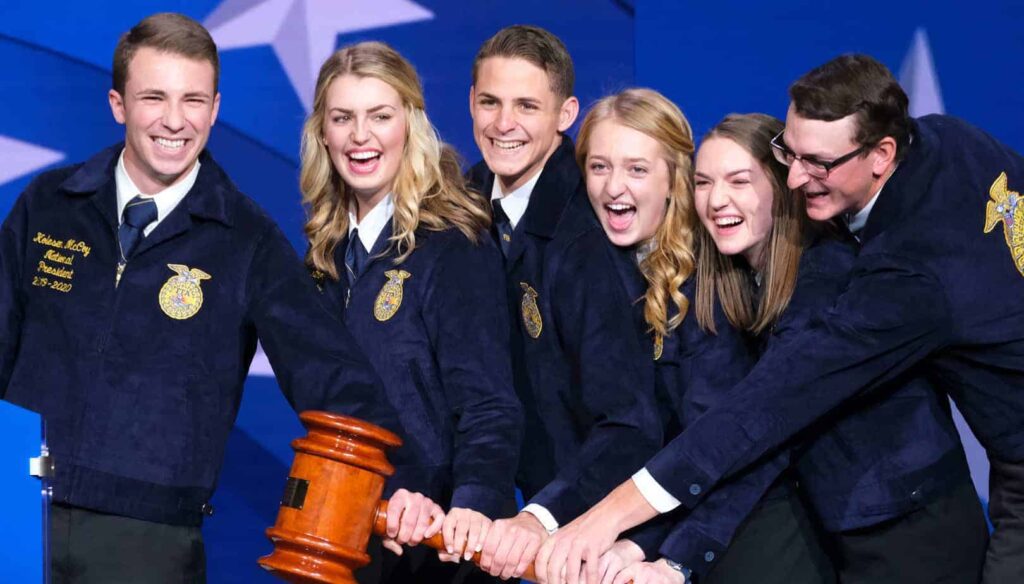Former public-school teachers plant new homeschool chapter of national ag program FFA in Nebraska
A new chapter of a national agricultural program has unlocked more opportunities for Nebraskan homeschool students previously unable to join.
From its launch in September 2022, the Nebraska…

A new chapter of a national agricultural program has unlocked more opportunities for Nebraskan homeschool students previously unable to join.
From its launch in September 2022, the Nebraska Agriculture Academy (NAA) provides ag-education opportunities for students who don’t fit within a typical classroom setting.
“A lot of the time in education, we talk about doing what’s best for the kids but don’t because the system is broken,” said Ann Dvorak, who handles the NAA’s business management, in an interview with agupdate.com.
Dvorak had worked as a public high school teacher but resigned after 14 years to homeschool her children and others through Schoolhouse Rock: An Acton Academy in Bassett.
“A lot of pressure is put on ag education teachers, with time invested outside of school. I felt I was either shorting my family or shorting my students,” she said.
How it started
The NAA is a chapter of the National FFA Organization, a youth organization dedicated to agricultural education and leadership. The letters stand for “Future Farmers of America.”
Breann Zimmer is NAA’s head teacher and co-FFA advisor. She started her first year of public-school teaching in 2020 during the COVID-19 pandemic, calling her experience a “God thing.”
After teaching in a year of remote learning and school closings, Zimmer decided to leave public education. She also knew she wanted to homeschool her future children after reflecting on her educational journey.
A homeschooling parent called her afterward, explaining how her daughter was unable to join the FFA since their school district required students to take six public school classes to participate.
“The Ag Academy was not an idea at this point,” Zimmer said. “I just thought it would be great if someone could make FFA and ag classes accessible to families that are running into this obstacle. … Little did I know that I would help sail that ship.”
Different requirements by school district
Because local districts could then set class requirements for students to participate in school activities, FFA requirements varied according to the family’s location.
“To be in FFA, some school districts required a student to take four or six classes at the public school,” Dvorak said. “That defeats the purpose of homeschooling.”
After homeschool families reached out to the Nebraska Department of Education (NDE) about this issue, the state passed a law requiring only one class to participate.
The NDE also helped Zimmer and Dvorak launch NAA with the support of Stacie Turnbull, the department’s agriculture, food and natural resources career field specialist.
Homeschooling’s flexibility in agriculture
Now homeschoolers can easily meet FFA requirements through the homeschool chapter by enrolling in two mini-modules, a minimum of three standard modules, or one mega-module. They can also join anytime during the year.
Zimmer found the inherent flexibility of homeschooling helped the inaugural class of eight homeschoolers determine nights as the best options for their meetings.
“The assumption is that homeschool students can meet any time. It really doesn’t work that way,” she said, noting most of them complete their core curriculum in the mornings. “The rest of the time they can really lean into their SAE’s (Supervised Agricultural Experiences).”
Zimmer personally visited each student to learn more about their SAE projects. She even traveled 4.5 hours from her home to see one student’s farm – the first time an FFA advisor did so, said one NAA student and third-generation FFA member.
The NAA functions like other FFA chapters with monthly meetings and six constitutional offices: president, vice president, secretary, treasurer, reporter and sentinel.
Because it’s a hybrid program, all classes and meetings occur online. Zimmer built the curriculum, which is intended to complement other homeschool programs with different module subjects and lengths.
‘The kids are so excited’
In addition to their monthly meetings, students ramp up their workload to meet twice weekly before district-wide judging contests.
Dvorak praised the homeschool students’ dedication to these practices, which helped them place competitively this year.
In one example, the academy’s veterinary science team won the champion ranking at the District 10 contest in Sargent.
“When I was teaching in the public school, I was fighting kids to come to practice and do things,” Dvorak said. “I felt like a drill sergeant, whereas with this organization the kids are so excited. They’re asking to have practice.”
The NAA offers payment for overnight stays for some of its members traveling more than three hours to compete. Zimmer ensured the chapter used grants from Farm Credit Services and the Turner Ranch to pay for these expenses.
“I want to make sure everything is affordable for families,” she said.
Several parents participating in the NAA shared their experiences, explaining the benefits for their children who formerly couldn’t join.
“I was so excited to have found NE Ag Academy for my daughter,” wrote Brenda, a mom whose testimonial is featured on NAA’s website. “Since we started homeschooling, she didn’t have the option to do FFA with an ag class outside of public school. It’s really been great for her to be a part of this program.”
Another mom, Karina, found the curriculum “far exceeded my expectations” and helped her daughter with bookkeeping for her SAE project.
“I am so excited to watch all these kids dive into their second year with the Nebraska Ag Academy,” she wrote. “They are writing history in Nebraska FFA and nationally!”
Plans for successive homeschool classes
Both Zimmer and the inaugural NAA class deserve credit for the program’s successful first year, Dvorak said.
“Breann has put in countless hours and worked really hard, but credit also goes to those first students involved last year who put their heart and souls into it,” she said. “They set the foundation and expectation for what it means to be part of the Nebraska Agriculture Academy.”
In the future, Zimmer hopes to expand the chapter’s curriculum offerings by partnering with other certified agriculture educators.
“I would love to contract with someone with a background in plant science or agronomy to build curriculum for these students,” she said.
Representatives from several Midwestern states – including South Dakota, Colorado and Kansas – have reached out to her regarding NAA, Zimmer said. While some states have similar programs, they tend to occur only within academies and private schools.
“I always wonder if I am doing the right thing, but to see God put all these stepping stones out for me and be obedient – for it to come to fruition in this light – I am baffled in the best way,” Zimmer said. “It has nothing to do with myself, Ann or Katie – it has everything to do with God and his plan of making agricultural education accessible for these kids.”



